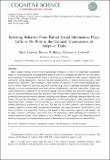Inferring behavior from partial social information plays little or no role in the cultural transmission of adaptive traits
Date
30/09/2020Metadata
Show full item recordAbstract
Many human cultural traits become increasingly beneficial as they are repeatedly transmitted, thanks to an accumulation of modifications made by successive generations. But how do later generations typically avoid modifications which revert traits to less beneficial forms already sampled and rejected by earlier generations? And how can later generations do so without direct exposure to their predecessors' behavior? One possibility is that learners are sensitive to cues of non‐random production in others' behavior, and that particular variants (e.g., those containing structural regularities unlikely to occur spontaneously) have been produced deliberately and with some effort. If this non‐random behavior is attributed to an informed strategy, then the learner may infer that apparent avoidance of certain possibilities indicates that these have already been sampled and rejected. This could potentially prevent performance plateaus resulting from learners modifying inherited behaviors randomly. We test this hypothesis in four experiments in which participants, either individually or in interacting dyads, attempt to locate rewards in a search grid, guided by partial information about another individual's experience of the task. We find that in some contexts, valid inferences about another's behavior can be made from partial information, and these inferences can be used in a way which facilitates trait adaptation. However, the benefit of these inferences appears to be limited, and in many contexts—including some which have the potential to make inferring the experience of another individual easier—there appears to be no benefit at all. We suggest that inferring previous behavior from partial social information plays a minimal role in the adaptation of cultural traits.
Citation
Atkinson , M , Blakey , K H & Caldwell , C A 2020 , ' Inferring behavior from partial social information plays little or no role in the cultural transmission of adaptive traits ' , Cognitive Science , vol. 44 , no. 10 , e12903 . https://doi.org/10.1111/cogs.12903
Publication
Cognitive Science
Status
Peer reviewed
ISSN
0364-0213Type
Journal article
Description
This project has received funding from the European Research Council (ERC) under the European Union's Horizon 2020 research and innovation program under grant agreement No. 648841 RATCHETCOG ERC‐2014‐CoG.Collections
Items in the St Andrews Research Repository are protected by copyright, with all rights reserved, unless otherwise indicated.

